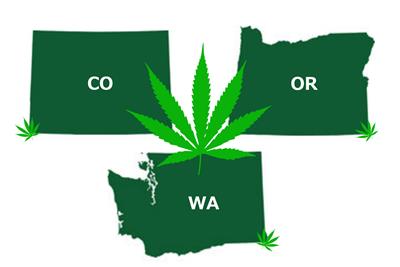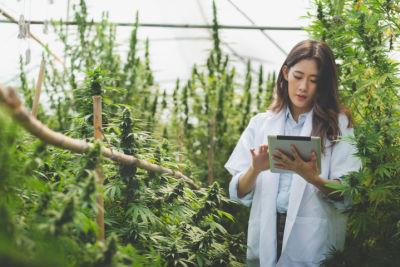
Tuesday January 5, 2016
 Education
Education
Do you know the difference between medical and recreational marijuana? If you’re a little unclear or simply need a refresher, you’re not alone. With the ever-growing list of states with either recreational or medical marijuana options, it’s often hard to keep up.
In an attempt to settle the confusion, we’ve outlined the biggest differences between the two in Colorado, Washington and Oregon, including variances between tax rates, purchase limits, product potency and more.
Colorado
Medical Marijuana in Colorado:
Tax Rate:
Colorado medical marijuana purchases are subject to a 2.9% state sales tax, plus local sales tax from about 3-10%.
Purchase/Possession Restrictions:
Colorado medical marijuana (MMJ) patients can possess up to 2 ounces of usable marijuana, which applies to all forms of cannabis products. New equivalency rules are set to go into effect in October 2016, which will change this to match dosages rather than weight.
Product Potency:
Although there’s no difference between medical and recreational flower and concentrates, medical edible potency (pdf) is often much higher than recreational products.
Where to Buy:
Colorado patients may purchase marijuana from any licensed dispensary in the state. In order to get medical prices and potencies, however, they must visit a medical dispensary and prove their medical status by showing their medical marijuana card (or “red card”) and a government-issued ID or passport.
How to Qualify:
Any Colorado resident with a valid social security number and a qualifying condition (pdf) is eligible for a medical marijuana card (including minors provided that their parents’ approve). Patients must submit written consent from their personal physician, plus $15 and a copy of their state-issued ID. Note that even if you have a red card issued from a different state, it will not be honored in Colorado.
Recreational Marijuana in Colorado:
Tax Rate:
In addition to the state tax rate of 2.9% and local sales tax, recreational marijuana purchases are subject to a 10% retail marijuana tax. Retail marijuana purchases also include an excess tax of 15%, which is rolled into the price of the product.
Purchase/Possession Restrictions:
Any adult (regardless of whether or not you’re a Colorado resident) may possess up to 1 ounce of marijuana in any form, however non-residents are restricted to purchasing no more than ¼ oz (or 7 grams) in a single transaction. Note that in October 2016, equivalency restrictions will limit residents to 8 grams of concentrates and visitors will be limited to 4 grams total or 2 grams per purchase. Edible purchases will be limited even further, as well.
Product Potency:
As we mentioned, there is no difference between medical and recreational flower and concentrates, but the standard dosage for recreational marijuana edibles is 10 mg, which must be clearly labeled on the package and product itself. Additionally, there cannot be more than 100 mg per package.
Where to Buy:
Recreational marijuana can only be purchased from recreational dispensaries. Customers must provide proof of age and residency with a government-issued ID or passport.
How to Qualify:
Anyone over 21 with a valid government-issued ID can purchase marijuana recreationally in Colorado, regardless of whether or not you’re a resident.
Washington
Medical Marijuana in Washington
Tax Rate:
Medical marijuana patients in Washington are exempt from marijuana taxes until June 30, 2017, provided that they are a part of the state registry at that time. If patients are not a part of the registry, they could be subject to state excise taxes (between 30-37% depending on what future tax proposals pass).
Purchase/Possession Restrictions:
Medical patients can currently purchase and possess up to 24 ounces of marijuana and up to 15 marijuana plants. The rules will change beginning July 1, 2016, when patients will only be able to purchase up to 3 ounces (if they’re part of the state registry, only 1 ounce if not) and possess up to 16 ounces of usable marijuana and 15 plants. (Note that patients will technically be able to purchase any combination of the following: 3 ounces of marijuana, 48 ounces of solid, marijuana-infused product, 216 ounces of marijuana-infused liquid product or 21 grams of concentrates.)
Product Potency:
There is no difference in potencies between recreational and medical marijuana products.
Where to Buy:
Currently, all medical marijuana patients must purchase their medicine from “medically endorsed”/recreational marijuana stores (as purely medical collectives are no longer legal due to Senate Bill 5052.)
How to Qualify:
Anyone with a qualifying medical condition can get a recognition card in Washington, provided that they have a written recommendation from their physician. Minors must also have written consent from patients.
Recreational Marijuana in Washington
Tax Rate:
Recreational marijuana tax rates in Washington have dropped recently to 37% total. In July, 2017, the rate is set to drop to 30% then to 25% in 2019.
Purchase Restrictions:
Recreational users can possess up to one ounce of usable marijuana, 16 ounces of solid, infused products, 72 ounces of marijuana-infused liquids or seven grams of concentrates.
Product Potency:
There is no difference in potencies between recreational and medical marijuana products.
Where to Buy:
Marijuana can be purchased from recreational dispensaries only. It is illegal to sell or trade marijuana in Washington without a license.
How to Qualify:
Anyone over 21 can purchase recreational marijuana in Washington.
Oregon
Medical Marijuana in Oregon
Tax Rate:
Oregon medical marijuana patients are exempt from marijuana taxes.
Purchase/Possession Restrictions:
Medical patients in Oregon can possess up to 24 ounces of “usable” marijuana including flower, concentrates, edibles, topicals and tinctures -- and up to 6 mature cannabis plants.
Product Potency:
There is currently no limit on edible potency for medical patients but that may change soon. Temporary draft rules set to roll out in late 2016 would set the average dose at 5mg with no more than 20 doses per package for medical users.
Where to Buy:
There are hundreds of medical marijuana dispensaries in Oregon, although some cities have banned sales. To find a medical marijuana dispensary near you, visit Oregon’s medical marijuana dispensary page.
How to Qualify:
Anyone with a qualifying medical condition and a written letter from a personal physician qualifies for a medical marijuana card in Oregon. Patients must submit a photocopy of their state-issued ID along with their physician’s statement each year to qualify.
Recreational Marijuana in Oregon
Tax Rate:
Beginning January 4, 2016, medical dispensaries will tack on a 25% sales tax on to recreational marijuana sales. When recreational dispensaries begin opening in the second half of 2016, tax rates will drop to a 17% statewide sales tax plus local sales taxes of up to 3% pending voter approval.
Purchase/Possession Restrictions:
Recreational users are currently only allowed to purchase cannabis flower (though this could change in the future). Each purchase is capped at 7 grams, with a total possession limit of 1 ounce.
Product Potency:
Edibles and concentrates are currently unavailable for recreational users though that could change in a year or so. At that time, recreational edible doses will tentatively be set at 5 mg each with no more than 10 doses per package.
Where to Buy:
While Oregon works to establish a recreational marijuana system, recreational users can purchase small amounts of cannabis from medical dispensaries. Some medical facilities do not sell recreational marijuana, however, so call ahead to be sure. Recreational facilities will begin opening late 2016.
How to Qualify:
Anyone over 21 can purchase marijuana recreationally in Oregon.
Photo Credit: PotGuide.com







